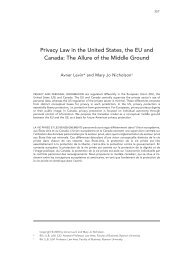Commentary on Fichte's “The Illegality of the Unauthorised ... - uoltj
Commentary on Fichte's “The Illegality of the Unauthorised ... - uoltj
Commentary on Fichte's “The Illegality of the Unauthorised ... - uoltj
You also want an ePaper? Increase the reach of your titles
YUMPU automatically turns print PDFs into web optimized ePapers that Google loves.
154 university <strong>of</strong> ottawa law & technology journal www.<strong>uoltj</strong>.ca<br />
utilitarian c<strong>on</strong>cepti<strong>on</strong>s. This has led Benoit to claim that Fichte appears “more<br />
Kantian than Kant.” 59<br />
5.2. The Pro<strong>of</strong> <strong>of</strong> <strong>the</strong> Argument a posteriori<br />
Having deduced <strong>the</strong> right <strong>of</strong> <strong>the</strong> author in her work from <strong>the</strong> nature <strong>of</strong> <strong>the</strong> book<br />
and <strong>the</strong> idea <strong>of</strong> right entailed by a recogniti<strong>on</strong> <strong>of</strong> human individuality, Fichte <strong>the</strong>n<br />
turns to <strong>the</strong> actual practices <strong>of</strong> publishers and authors to dem<strong>on</strong>strate that <strong>the</strong><br />
rights <strong>of</strong> <strong>the</strong> author that he has deduced a priori are able to justify this practice. He<br />
examines each <strong>of</strong> <strong>the</strong> aspects <strong>of</strong> <strong>the</strong> book in turn: its physical aspect, its c<strong>on</strong>tent,<br />
and <strong>the</strong> form in which <strong>the</strong> c<strong>on</strong>tent is expressed. With regard to <strong>the</strong> physical aspects<br />
<strong>of</strong> <strong>the</strong> book, <strong>the</strong> existence <strong>of</strong> libraries dem<strong>on</strong>strates that <strong>the</strong> right <strong>of</strong> <strong>the</strong> author in a<br />
book that has been sold to ano<strong>the</strong>r is not in <strong>the</strong> physical object itself. If it were, <strong>the</strong>n<br />
<strong>the</strong> author would have a legitimate claim that libraries are a violati<strong>on</strong> <strong>of</strong> her rights.<br />
However, while it is evidently financially disadvantageous to <strong>the</strong> author, as <strong>the</strong> seller<br />
<strong>of</strong> books, to have <strong>the</strong>m available in libraries, <strong>the</strong> fact that <strong>the</strong> author has no right<br />
to prevent <strong>the</strong> lending <strong>of</strong> books through libraries dem<strong>on</strong>strates that, with <strong>the</strong> sale<br />
<strong>of</strong> <strong>the</strong> book, <strong>the</strong> right in <strong>the</strong> physical object has been transferred to ano<strong>the</strong>r. 60 This<br />
transfer <strong>of</strong> rights is also evident in <strong>the</strong> fact that <strong>the</strong> author has no right to prevent<br />
<strong>the</strong> purchaser from destroying her book.<br />
With regard to <strong>the</strong> right in ideas, <strong>the</strong> academic use <strong>of</strong> books dem<strong>on</strong>strates<br />
that <strong>the</strong> author has no exclusive right in <strong>the</strong> c<strong>on</strong>tent <strong>of</strong> <strong>the</strong> book. The ideas are in <strong>the</strong><br />
public domain, and <strong>the</strong>y can be appropriated by o<strong>the</strong>rs through study, portrayed<br />
in various ways, and applied to different subject matters to yield new results. 61<br />
This fact explains why it is permissible for a pers<strong>on</strong> to express <strong>the</strong> ideas <strong>of</strong> ano<strong>the</strong>r<br />
(for instance, those heard during a public lecture) in her own words. 62 In c<strong>on</strong>trast,<br />
plagiarism, i.e. <strong>the</strong> direct copying <strong>of</strong> <strong>the</strong> words used by ano<strong>the</strong>r to express an idea,<br />
is a violati<strong>on</strong> <strong>of</strong> <strong>the</strong> author’s rights. In c<strong>on</strong>trast to <strong>the</strong> views <strong>of</strong> Reimarus, Fichte’s<br />
antag<strong>on</strong>ist, plagiarism is forbidden, not because it fails to attribute <strong>the</strong> words to<br />
<strong>the</strong> author, but because, in ignoring <strong>the</strong> fact that <strong>the</strong>y were authored by ano<strong>the</strong>r, it<br />
denies <strong>the</strong> o<strong>the</strong>r’s right to <strong>the</strong> expressi<strong>on</strong> and <strong>the</strong>reby violates <strong>the</strong> very idea <strong>of</strong> right,<br />
i.e. <strong>the</strong> idea that those things which express a pers<strong>on</strong>’s intellectual pers<strong>on</strong>ality must<br />
not be appropriated by ano<strong>the</strong>r. It is not simply that <strong>the</strong> plagiarist fails to attribute<br />
authorship, but that through this failure, he appropriates as his own what bel<strong>on</strong>gs<br />
to ano<strong>the</strong>r and <strong>the</strong>reby denies <strong>the</strong> o<strong>the</strong>r’s capacity for authorship. 63<br />
Thus we see that <strong>the</strong> proscribed practices, such as plagiarism, as well as<br />
<strong>the</strong> practices that are permitted, such as <strong>the</strong> lending <strong>of</strong> books, <strong>the</strong> destructi<strong>on</strong> <strong>of</strong><br />
books, <strong>the</strong> use <strong>of</strong> <strong>the</strong>ir c<strong>on</strong>tents and <strong>the</strong> applicati<strong>on</strong> <strong>of</strong> <strong>the</strong>se ideas to new fields,<br />
are c<strong>on</strong>sistent with Fichte’s asserti<strong>on</strong> that <strong>the</strong> author has a right in <strong>the</strong> form <strong>of</strong> <strong>the</strong><br />
expressi<strong>on</strong> but not in <strong>the</strong> c<strong>on</strong>tent <strong>of</strong> <strong>the</strong> ideas or <strong>the</strong> physical object <strong>on</strong>ce <strong>the</strong> latter<br />
is sold to ano<strong>the</strong>r.<br />
59. Benoit, “En guise d’introducti<strong>on</strong> au texte de Fichte,” supra note 7 at p. 99.<br />
60. Fichte, “Pro<strong>of</strong> <strong>of</strong> <strong>the</strong> <strong>Illegality</strong> <strong>of</strong> <strong>the</strong> Reproducti<strong>on</strong> <strong>of</strong> Books,” supra note 2 at para. 10.<br />
61. Fichte, “Pro<strong>of</strong> <strong>of</strong> <strong>the</strong> <strong>Illegality</strong> <strong>of</strong> <strong>the</strong> Reproducti<strong>on</strong> <strong>of</strong> Books,” supra note 2 at para. 10.<br />
62. Fichte, “Pro<strong>of</strong> <strong>of</strong> <strong>the</strong> <strong>Illegality</strong> <strong>of</strong> <strong>the</strong> Reproducti<strong>on</strong> <strong>of</strong> Books,” supra note 2 at para. 13.<br />
63. Fichte, “Pro<strong>of</strong> <strong>of</strong> <strong>the</strong> <strong>Illegality</strong> <strong>of</strong> <strong>the</strong> Reproducti<strong>on</strong> <strong>of</strong> Books,” supra note 2 at para. 11. It is interesting to<br />
c<strong>on</strong>sider whe<strong>the</strong>r Fichte’s account <strong>of</strong> plagiarism is c<strong>on</strong>sistent with our modern understanding. The modern<br />
c<strong>on</strong>cept <strong>of</strong> plagiarism seems broader than Fichte’s, since Fichte says that it is not plagiarism for an author to<br />
repeat <strong>the</strong> ideas <strong>of</strong> ano<strong>the</strong>r without attributi<strong>on</strong>, as l<strong>on</strong>g as he does not use <strong>the</strong> author’s exact words. See<br />
Fichte, “Pro<strong>of</strong> <strong>of</strong> <strong>the</strong> <strong>Illegality</strong> <strong>of</strong> <strong>the</strong> Reproducti<strong>on</strong> <strong>of</strong> Books,” supra note 2 at para. 12.









